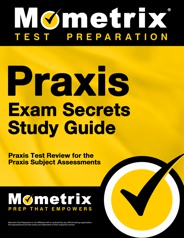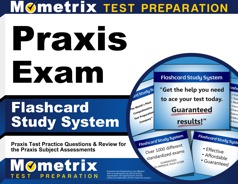The Praxis Technology Education exam is designed to measure the technological knowledge and skills that are essential for entry-level middle school and high school teachers.
Click “Start Test” above to take a free Praxis Technology Education practice test, and check out our premium-quality Praxis test prep resources by clicking the links below!
Exam Outline
The Praxis Chemistry exam contains 120 selected-response questions, and you will be given a time limit of 2 hours.
The exam is split into six content categories, which are designed to cover the various competencies and points of knowledge that an educator should possess.
I. Technology and Society (18 questions)
The questions in this category assess your knowledge of the following:
- The nature of technology, technology literacy, and technology education
- How innovation and invention occur
- How innovation and invention are influenced by economic and cultural factors
- How technological development is influenced by other fields of study
- The influence that significant technological innovations have had on human history
- Critical changes in technology through the different periods of human history
- How various factors affect technology development
- The impact of technology on society and on social institutions
- Ways to decrease the negative environmental impact of technological systems and processes
- Relationships between engineering, mathematics, science, and technology
II. Technological Design and Problem-Solving (24 questions)
The questions in this category assess your knowledge of the following:
- How to implement and document the steps of a design process
- Selecting and using tools in a design process
- Identifying problems and defining design requirements
- Generating possible solutions to design problems
- Selecting, developing, and refining design proposals
- Organizing and communicating solutions to design problems
- Systems thinking
- The lack of a perfect design
- Operating, maintaining, and troubleshooting technological systems
- Applying the design process to systems and problems in power, energy, and transportation
- Applying the design process to problems in information technology and communications technology
- Applying the design process to problems in manufacturing and construction
III. Energy, Power, and Transportation (18 questions)
The questions in this category assess your knowledge of the following:
- Utilizing various types of control systems
- Applying mathematical and scientific principles to solve problems
- Energy utilization systems
- The inputs used in transportation systems
- Components of vehicles and support systems
- Different processes involved in transportation operations
- Different forms of energy
- Modeling the relationship between energy, power, and work
- How energy is measured and controlled
- Applying concepts of energy and power to solve problems
- Different ways power is generated and used
- Applying safety practices related to working with energy and power
IV. Information and Communication Technologies (18 questions)
The questions in this category assess your knowledge of the following:
- Major concepts and terminology related to information systems
- Identifying appropriate tools and materials to address specific problems
- Using operating systems, software applications, communication devices, and networking components in the classroom/laboratory
- Various types of network structures
- Concepts that make up a communications system
- Concepts and terminology related to video, audio, data, electronic, graphic, and technical communications
- Arranging the elements of a communication message to be effective and aesthetically pleasing
- The impact of communication technology and media on society and culture
- Legal and ethical issues regarding the use of communications and information technologies
- Issues and trends in information and communications technologies
V. Manufacturing and Construction Technologies (18 questions)
The questions in this category assess your knowledge of the following:
- Management functions used in construction and manufacturing
- Applying a systems model to manufacturing and construction processes
- Key concepts associated with the efficiency of production
- Differences between manufacturing systems that involve flexible, continuous, batch, and custom production
- The variety and properties of materials used in the manufacture of products
- Evaluating the suitability of material to different manufacturing purposes
- Primary processing methods of converting raw materials into industrial materials or standard stock
- Key concepts and terminology related to construction
- The variety and purposes of materials used in the construction of structures
- The numerous constraints on structural designs
- The systems and subsystems of buildings and structures and the functions they perform
- Static and dynamic loads and how they produce forces that affect stability and failure in a structure
- The variety of processes used in construction
VI. Pedagogical and Professional Studies (24 questions)
The questions in this category assess your knowledge of the following:
- Creating and implementing a curriculum based on national and state standards for a technology education program
- Selecting appropriate instructional content and developing learning activities
- Choosing, adapting, and implementing instructional strategies appropriate to both the content and learning level
- The importance of designing and implementing instructional activities that emphasize problem-solving
- Applying appropriate instructional technology equipment, processes, materials, and tools to enhance teaching
- Selecting and using a variety of assessment methods to monitor and evaluate student learning and instructional effectiveness
- Creating and maintaining a safe and healthy learning environment
- The relationship between student organizations and classroom learning
- The relationship between advisory committees and technology education
- Modifying instructional activities and methods to address students’ diverse needs
- The importance of promoting technology education internally and externally
- The importance of becoming involved in professional associations and organizations related to technology education
- The importance of professional growth
- Current educational legislation, policy, and funding opportunities
- Opportunities for further education and careers
- The history, trends, and issues related to technology education
- The management of resources, budgets, and records
- The importance of collaborating with other school faculty to design instruction that integrates knowledge and skills from other core academic subject areas
Check Out Mometrix's Praxis Technology Education (5051) Study Guide
Get practice questions, video tutorials, and detailed study lessons
Get Your Study Guide
Registration
To register for the Praxis Chemistry Content Knowledge exam, you will need to create an online account with ETS. Through this account, you can submit an application to take the exam.
During registration, you will be asked to select the test-taking format (remote or at a testing center), test location (if you are taking the test at a testing center), and test date. You will also need to pay the $130 exam fee.
Test Day
In-person Testing
You should plan to arrive at the testing center 15-30 minutes before the scheduled testing appointment. For the check-in process, you will be asked to provide a printed copy of your admission ticket and two forms of valid identification.
You will also be asked to store all personal items, such as your cell phone, wallet, bags, and keys, in a secure locker before entering the testing area.
Once the check-in process is complete and you are fully approved for testing, you will be led to the testing station and given a brief tutorial on the testing system.
Remote Testing
To take the exam remotely, you must use a laptop or desktop computer that has the ETS Secure Test Browser downloaded and installed on it. This is the browser you must use to take the exam. You will also need a functioning webcam, speakers, and a microphone.
When you check in to take the exam, the remote proctor will ask you to show proof of identification and to move your webcam around the room so that your testing area can be observed. Once the proctor has approved your testing area, they will walk you through the testing process and begin your exam.
How the Exam is Scored
Your Praxis Technology Education exam score is based on the number of questions you answer correctly (your raw score). Your raw score is converted to a scaled score. The scaled score you need to obtain differs slightly depending on which state you take the exam in, but most states require a minimum scaled score of 159.
You should receive an official score report about five weeks after testing.
Check Out Mometrix's Praxis Technology Education (5051) Flashcards
Get complex subjects broken down into easily understandable concepts
Get Your Flashcards
FAQs
Q
How many questions are on the Praxis Technology Education (5051) exam?
A
There are 120 selected-response questions on the exam.
Q
How long is the Praxis Technology Education (5051) exam?
A
The time limit for this exam is 2 hours.
Q
What is the passing score for the Praxis Technology Education (5051) exam?
A
Each state has its own passing score requirements.
Q
How much does the Praxis Technology Education (5051) exam cost?
A
The examination fee is $130.

